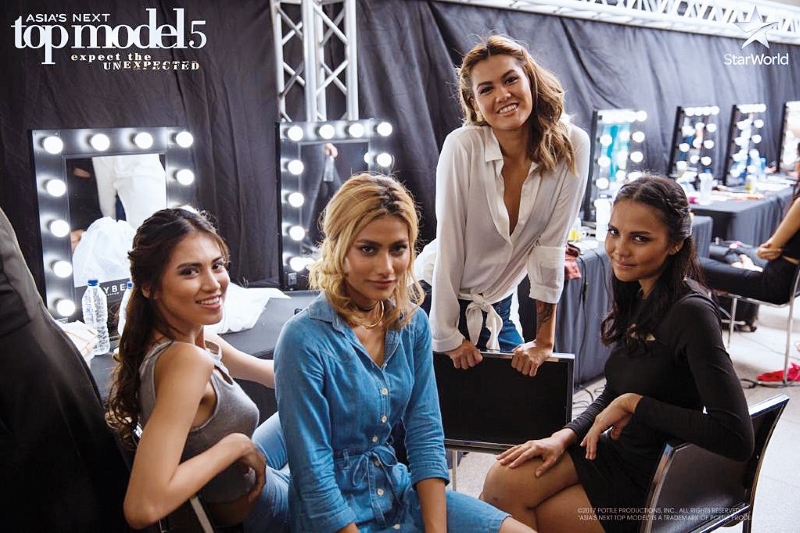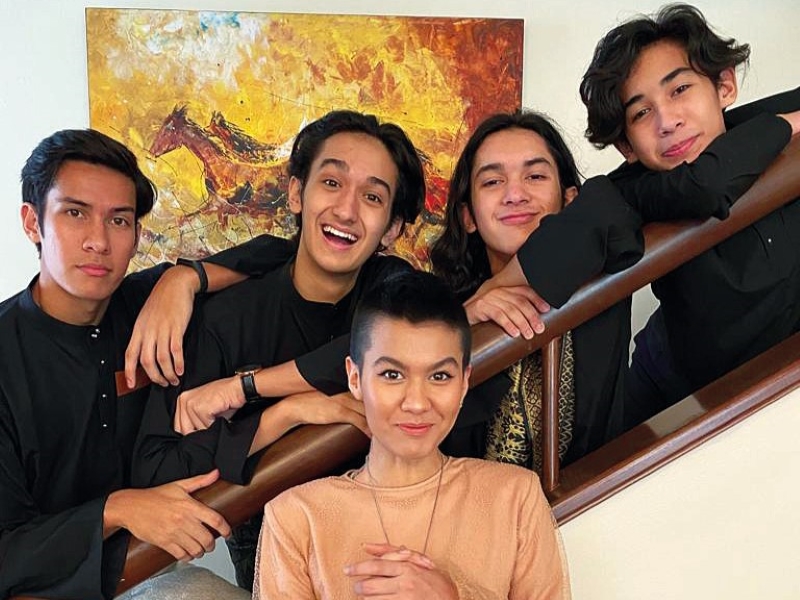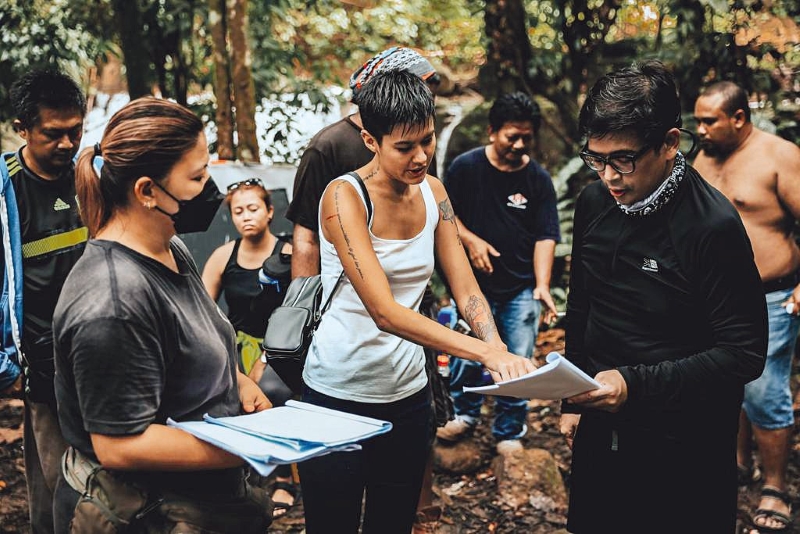
Alicia is wearing Cartier’s Panthère de Cartier necklace with a Max Mara grey suit and Roger Vivier heels (Photo: Steve Koh/ Image Rom)
Alicia Amin knows and speaks her mind when it comes to things people think she should not do. No apologies. Like it or not, “I’m gonna continue doing whatever I want”, she says. This is not defiance by a young upstart too full of herself. They are the thoughts of someone in the public eye who, through the years, has come to terms with callous remarks thrown at her by those inclined towards purist thinking.
“I don’t even think I’m like super famous or whatever. I think I’m infamous. I feel like a lot of people know me, but don’t like me, which is fine because our standards of morality in this country are very one-way.
“Half the time, I don’t even understand myself, so I do my best not to judge others. I could sit there and get really riled by my emotions. Sure, I am inconvenienced. I’m irritated and triggered. But I tell myself, relax. On a good day, I’m very cavalier,” says the model-cum-actress known for her unorthodox ways.
On a busy day, such as when she modelled a new collection of high jewellery brought into Kuala Lumpur by Cartier, Alicia keeps a cool head on sturdy shoulders. Watching her at work, what comes across is a sensible 28-year-old who knows what she is good at and just wants to do her job well. And questions about her beliefs, tattoos and revealing outfits, or how she lives, from people who have no business asking in the first place will not stop her.
Alicia is vocal about the welfare of models. In the ephemeral business of fashion and an industry known for being superficial, these issues bear repeating because they affect the livelihood of young girls who often get short shrift but have no way of fighting back or protecting themselves.
Power play vs respect
People will remember Alicia for standing alone with a placard held high at the entrance to Pavilion Kuala Lumpur during KL Fashion Week 2022, urging models still waiting for payment owed them by event founder Andrew Tan to speak to her.
Many assume she was protesting for higher fees, a point she is quick to correct. “This was just about fighting to be paid — they had been owed money for years. It’s hard to fight for better pay when people aren’t even paying models what they owe.”
Freelancers in general are short-changed and, in modelling, maybe there is a bit more room for predatory behaviour, Alicia says. “It’s lack of respect and a kind of power play. A lot of big brands often assume because they’re bigger, one will not, or cannot, take legal action against them. And they can always tease us with, ‘Oh, why, your face is everywhere! It’s exposure.’ A lot of people buy into that because they don’t want to be seen as demanding or hard to work with.”
This exploitation generally happens in any country that does not have good laws to protect freelancers, she notes. Models are made to sign release forms, which literally allow all forms of use of their images. “If you’re new, especially, you cannot contest because you do not know how to do it.”
Having a manager, which did not happen for her until after she had been doing fashion shows and campaigns for eight years, helped and “it really changed my life”, she says.
img-20231114-wa0014.jpg

Starting out
Like everyone else, Alicia went through the mill when she first stepped onto the catwalk at age 15. Commend her for her poise and confidence, and she will tell you it all boils down to training.
“I spent a lot of time looking in the mirror practising posing. In 2010, we didn’t have all the Instagram reels on how to move. It was more search your favourite models on Tumblr, scour the editorial write-ups and copy everything they do.
“I mean, everything’s a copy of a copy of a copy. You start from there. Obviously, your body is not the same and the way somebody walks is different. So, you research, make adjustments and practise. It was more of, ‘This had better look good’ rather than ‘Oh, I know I look good’.”
She owes her early start to being that “naughty kid who wanted extra money to go out and do naughty kid stuff”. But her parents were strict and did not allow their firstborn, and only girl, to hang out with friends.
“Because they didn’t want to fund me, I had to get my own pocket money. Essentially, modelling started because of my rebellious nature of wanting to do whatever I wanted. Then it turned into my whole life, which I’m very happy about.”
Of course, there was objection. “I mean, mum is a lawyer and dad, a heart surgeon. With parents like that, what was I doing?”
Funnily enough, when the family situation changed and, with it, the course of her future, modelling became a lifeline of sorts.
“I did end up going to university in Australia and was doing psychology when, at 22, I had to come back halfway because my parents were finally getting divorced. As the oldest child watching [their marriage] unfold through my teenage years, I was just like, ‘Go and be happy without each other’.”
There was still the question of, if she does not complete her studies, what is she going to do? Her father’s reply was to the point: “You have all of your modelling stuff; you’ll be okay.”
“Honestly, I was getting the short end of the stick. Before leaving for Melbourne, I was working and did have somewhat of a career. And if he was going to throw one of his kids under the bus, it would be the one capable of being independent lah.
“I wouldn’t say he threw me under the bus but, basically, he was saying, ‘Because it was a financial decision, Alicia, you’re somebody who, even if you were left in a drain somewhere, you would figure it out compared to all your brothers.’”
Dad obviously knows best because, as she herself admits when reminded it must be great having four protective brothers, “I’m the one protecting them. The [gender] stereotype doesn’t exist when you’re the eldest daughter.”
img-20231114-wa0018.jpg

Asia's Next Top Model
It was 2017 and Alicia had been away for two years. “This is an industry where it is ‘out of sight out of mind’. I heard about Asia’s Next Top Model (AsNTM), Cycle 5, applied and got in. I came back one month before the show aired. The timing was right and it was a big thing. In a way, I was lucky my dad decided that I come home when he did.”
Alicia was eliminated in the fifth round of the reality-based model search show but, indirectly, it opened doors to TV work for her. “I got my first Malay drama, which I will not name because I was terrible, after they saw me on AsNTM.”
She has not signed with any brand but has worked closely with big names such as Louis Vuitton, Burberry, Calvin Klein and YSL in the last two years. Shoots have taken Alicia, who is of Malaysian and half-German heritage, to Germany and other countries.
Her acting credits in TV dramas and on film include The Disappearance of Irdina Adhwa — in which she learnt to shoot a bow and arrow so well “even archers were impressed”; That Cover Girl; Salina; KL Gangster: Underworld; Persepsi; Rasuk; Ren & Bo; Keluarga Baha Don; The Bridge, Season 2; and Ex Aku Pontinak. Six years after going on reel, she considers herself still new and is game to cover as many genres and characters as possible to avoid being stereotyped.
A recent Amazon Original release, That Cover Girl, sees her cast as the titular character’s business partner. “This role was very different for me because she says a lot of things that have probably been said to Alicia Amin. She is struggling to keep somebody in the limelight down to earth. Playing this part, I had to reflect on people who thought I was out of line or crazy or too whatever. Which was fun because, if anything, I understand them even more now, at least in my imagination of how they felt.”
Should modelling and acting clash now, Alicia will prioritise the latter. Both require a person to let go of her ego, in different ways.
“When modelling, you have to do your best to look beautiful in the most uncomfortable way, with the high heels, the makeup, the clothes. People ask if I’m comfortable wearing something. It doesn’t matter because it’s really not about you. You’re just a medium, the canvas.
“Acting is very much about you are not you — you are the character you’re playing. Obviously, there are the technical aspects: knowing how to look good and knowing your angles for film, which is completely different from for modelling.
“After doing this for almost half my life, I feel like I can say I’m good at it. I’ve developed a certain set of skills and know I can rock up on set.”
Looking at how her acting career is taking shape, Alicia says: “Half the time, I’m wrong about everything. But I’ve always trusted myself and my gut feeling. Eventually, when things unfold in life, what you’ve worked hard for will not betray you as long as you put your heart and soul into it. That’s how it has turned out for me.”
img-20231114-wa0023.jpg

ADHD, ageing + body diversity
Alicia chooses to have a work schedule that is not packed back to back to allow time for work and other things.
“I’m not sure if I can say I’ve always been independent. It’s more like I’ve always been a bit unhinged. If we’re going [into] the whole science thing, I do have ADHD, which makes me very restless naturally. And I didn’t find this out until I was 24.”
With the professional diagnosis, a lot of things suddenly made sense to her, such as why she could not sit still; why she must always feel a certain level of chaos or adrenaline; or why she is always after a dopamine rush.
“That said, I love it. It’s my identity in a way. I take medication when I absolutely need to relax, calm down and maybe focus, talk a bit slower and level up my thoughts. But I feel like if I’m like that all the time, I won’t know who I am anymore.”
Her hope, ultimately, is for the scrutiny surrounding mental illness to “just disappear” so people can be more open about the issue. It will help the person in question, she adds.
Work has become more enjoyable as she feels a sense of stability and confidence that was not there before, and having less to prove but a bit more of sharing space with others.
“It’s the best part about being an ageing model.”
That said, she has started slowing down, from doing about 28 shows at KL Fashion Week 2019 to two last year. “I cannot be bothered to be model-skinny anymore — it’s very tiring. Also, 28 may not be old but your metabolism isn’t the same as when you were 24. I’m fine with that.”
Weight aside, she is also in a better position to question whether a crazy, backbreaking shot is really necessary or, if her knee hurts, maybe suggest dropping a pose. Where would she draw the line on nudity?
“For me, anything that involves nudity, or implied nudity, or any sexiness, has to make sense. It has to really, really make sense.
“I have a personal portrait of me lying completely naked on this, like red ball thing. Why did we shoot it? I don’t know. It felt like it would be a good photo. And I really like it. So, I’m gonna turn it into a painting. Where am I going to put it? Probably in my living room. You know what I mean?”
sk_theedge_00302-copy_02.jpg

With fashion embracing body diversity, this is a good time to be a model says Alicia, who has been called “mum legs” to “chubby” because of her pear-shape body. “I started at a time when I would go for a casting and they would look me up and down and go, “Do you think you can lose those thighs in two weeks?”
Half the terms are endearments because they are used by friends in the industry. Even so, “they came from an expectation to be smaller. This was the time of America’s Next Top Model and Tyra Banks and you want to feel like you’re a big-time designer or a big-time photographer. And you’re sassy”.
Things are different now and she is glad to see Malaysian models such as Vanizha Vasanthanathan and Rubini Sambanthan taking responsibility in pushing for diversity and calling out unfair representation. “These people are loud and standing their ground. They are forced into your field of view and you realise, ‘Oh, I do like them,’ and then, ‘This is what they care about’. And then it opens your world. In those ways, 100%, it’s great.
“I’m aware that this industry is still very small. Even if we don’t get along, we should always support each other, no matter what, in terms of social media. It’s not being fake. If someone does a good thing, no matter how I feel about them, I think it’s important to push and just share because we could be doing so much more.”
Looking to the future
Keeping an eye on career shelf-life, Alicia looks forward to playing distinguished, older women one day. By then, she hopes, she would be able to inject her own experiences into those roles.
“Older women models are a wonderful representation and I’m all for it. But not everybody’s a Naomi Campbell, and I do feel modelling is for the younger girls. I don’t think there’s anything wrong with bowing out and letting them take over.”
Eventually, Alicia wants to produce her own short films. She has some ideas in mind and is mustering the courage to put them down on paper and get started. Perhaps this anime fan can draw inspiration from Japanese manga writers who blow her mind away with their political, dystopian stories. “They put so much thought into the characters and their imagination is limitless.”
Down the road, Alicia also hopes to work behind the scenes on films. “I do want to find the time to get into theatre because that’s where my love for acting began.”
She joined the drama club while in high school in Singapore, where the family spent two years before moving to KL. “We took part in the Singapore Youth Festival and got silver. I would like to have the opportunity to go back into that because it was kind of the spark.”
The fashion world is enticing, too. “I don’t know whether it’ll be about creating my own brand, but I do feel, eventually, all of the experiences I have would be useful somewhere — clothes, theatre, film. I mean, I would love to be like Meryl Streep, Audrey Hepburn or Joan Rivers and perform until I can no longer do it. Performance has given me so much joy; it’s got me through so much. I feel like that would be the best way to see anything through to the end.”
But should creative dreams not come to pass, you can be sure Alicia will find a way out because she has something she can count on: muscle power. During the pandemic, when modelling came to a standstill, she made Rendang Tok, using her late grandmother’s recipe, to pass time.
“I did it all by myself, 20kg a day. My siblings didn’t want to help and I had no money to hire staff. It was so tiring; 10 hours to cook one batch.” In the end, they sold very well and cooking also proved therapeutic for Alicia, who lives with four cats and two dogs. At one time, there were 15 felines in her fur family, as well as Vivaldi, a retired racehorse her father gave her for doing well in the UPSR exam.
Alicia rode him and represented Wilayah Persekutuan in dressage at SUKMA 2010. When he died unexpectedly from a wound just before she left for Australia, she drew comfort from the fact that he had been living his best life by the beach in Terengganu. Having Vivaldi was “an experience of being responsible and very loving. I had a very deep connection with an animal that was not like just a pet. Dressage is about lots of trust, patience and understanding. I would like to believe I was a good rider”.
This article first appeared on Nov 20, 2023 in The Edge Malaysia.


